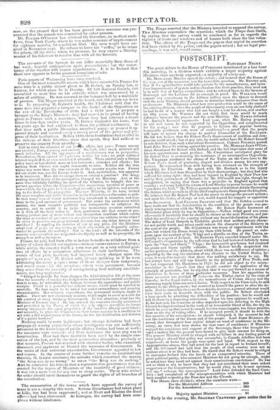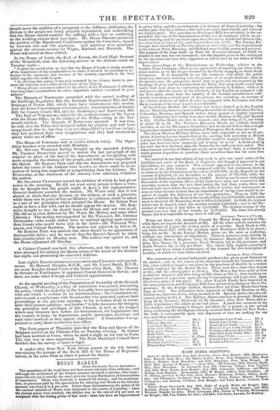POSTSCRIPT.
SATURDAY NIGHT.
The great debate in the House of Commons terminated at a late hour this morning, in a division which exhibits a larger majority against Ministers than anybody expected—a majority of ninety-one. Mr. MorreKrox MILNE'S opened the debate; and insisted that the fitness of the men, not of the measures, was the immediate question. Mr. Rxeoeax said, that if the agriculturists would take pattern by the manufacturers, and intro- duce improvements of system and mechanism into their practice, they need not he in such fear of foreign competition ; and he referred them to the farmers of Roxburgh and the Lothians for an example in proof. Mr. WALLACE would support any amendment to the Address calling upon the Queen to demand that the next Ministry should promise to introduce better measures than their predecessors. ?Ir. HINDLEY asked how over-production could be the cause of the existing distress, when the people of this country even are not fully clothed? he had heard of a weaver who had not bought a coat for eleven, and another for fifty years. Mr. W TONEY did not think that there would be much difference between the present and the next Ministry. Mr. HAWES defended Mr. Baring's financial arguments. Last year, when Mr. Baring proposed to add new taxes, he was supported by the Opposition, and complimented for his energy : now that lie proposes to lighten the popular burdens, honourable gentlemen vote want of confidence 1—a proof that the people will have to repent the change to another Chancellor of the Exchequer. Be did not believe that Sir Robert Peel's Government of coalition and com- promise could stand ; but at any rate, he would rather have Sir Robert himself as sole dictator, than such a discordant Government. Captain Poissm.r. quoted Lord John Russe't's writing against his practice. Mr. MORGAN JOHN (MON.. NELL threatened Sir Robert with Ireland, and the bad impression that some of his new appointments must produce. Mr. CHRISTMAS anticipated glory for Sir Robert Peel in overcoming the resistance of an unscrupulous Opposition. Mr. VILLIERS attributed the silence of the Tories on the Corn-laws to Sir Robert Peel's dread of producing disgust and division among his own sup- porters. He reproached them with having been returned on the strength of friendship for Chartists. He agreed with Mr. Roebuck as to the injury which Ministers had done themselves by their shortcomings ; but they bad also suffered for doing right : they had been injured in England by their Poor-law and by their government of Ireland; for Mr. O'Connell was right, though he exaggerated, in saying that there was a prejudice in England against that country ; and many hailed the return of Lord Stanley to power because he would " put down the Irish." Mr. Villiers quoted a mass of statistical details illustrating the distress which prevails in all the chief employments throughout the kingdom. He believed that Sir Robert Peel had the power to change the present system; and upon his choice, of change or not, would depend his support or opposition from the country. Lord FRANCIS EGERTON said that Mr. Cobden seemed to have made out that the deterioration in the condition of the people was pre- cisely cotemporaneoas with the Whig rule. Sir Robert Peels treatment of Ministerial plans while he was in Opposition,—Nullum tetigit quad non orna- eit,—maele it inevitable that'he should be chosen as the next Premier, and jus- tified the confidence of the country without any formaldeclaration of his plans. "The defeat of Lord Morpeth in Yorkshire proved that neither private charac- ter nor public worth and talent could redeem the character of the Ministry in the eyes of the people. Mr, O'CONNELL was weary of experiments with the poor, but wished the House would try them with bread. He passed an eulo- glum upon the conduct of the Whigs and a diatribe on that of the Tories, es- pecially in respect of Ireland. Sir ROBERT PEEL consoled himself under Mr. O'Connell's vituperation by the reflection that he had bestowed infinitely worse upon the "base and bloody" Whigs : the honourable gentleman had rendered his praise and blame equally valuable. Sir Robert briefly despatched the earlier portions of the Address, about which there was no difference of opinion ; regretting by the way the omission of any allusion to the United States, be- cause it seemed to indicate that there was nothing satisfactory to say. He had always been and still was friendly to the principles of Free Trade, and he had supported Mr. Huskisson in 1825: he did not object to the recom- mendation in the Speech that they should consider the application of the principle of .protection, but he objected that it was put forward as a means of solicitation in favour of threearticular measures. Now his opposition to those measures was justified by facts—to the Timber-duties by the state of Canada; to the Sugar-duties, by the remembrance of Cuban slavery and the increasing supply from our own colonies. With respect to the Corn-laws, be still adhered to the sliding-scale; but reserved to himself the power to alter the de- tails. Had he stated his views on those details, however, a general attempt would have been made to discredit them with the public. Sir Robert concluded a long speech by admitting the difficulties of his position : but be would not add to them by a degrading submission. Upon his own opinions he would act. lf, for instance, his retention of office depended upon his deferring to the High Church feelings developed in the work of an honourable friend of his, the day on which he gave up that power he should feel ten times happier, ten times prouder, than on the day of taking office. If he accepted power, it should be with the free exercise of his own opinion : he should relinquish it the moment he had not the confidence of the House and of the people. Lord JOHN RUSSELL ob- served, that throughout four nights' debate on want of confidence in the Mi- nistry, no cause had been shown for that want of confidence: if Ministers enjoyed the confidence and support of the Sovereign, those who brought for- ward a motion like the present were bound to give their reasons for doing so. The present Ministry could be charged with no failure in any leading point of their policy : abroad that policy was successful; in Canada rebellion had been suppressed ; at home the people were quiet and loyal. With respect to the Appropriation-clause, they had acted for the best in regard to Ireland herself; and Mr. O'Connell had said that the people of that country were not so anxious about it as they had been. He feared that Sir Robert would be obliged to surrender Ireland into the hands of an exasperated minority. Those of great political purity, who censured Ministers for not going far enough, might be asked how they could act against their conscientious convictions? He was not so blind as not to know that they had not conciliated their more ardent supporters or the Conservatives; but he would cling to his honest opinions, and say, welcome the consequences." Lord John defended the fixed Corn- duty ; and complained of the misrepresentations with which Ministers had been assailed respecting the Poor-law and the Church. The House then divided; when the numbers were— Early in the evening, Mr. SHARMAN Caemrsoap gave notice that he
For the Ministerial Address 269 For the Amendment 360
Majority against Ministers
91
should move the addition of a paragraph to the Address, attributing the distress to the people not being properly represented, and undertaking that the House should consider the suffrage with a view to conferring on the working-classes their just right. Mr. Manx PHILIPS presented the petition of the Manchester Conference against the Corn-laws, signed by between 600 and 700 ministers. And petitions were presented against the election-returns for Wigan, Rutland, and Harwich. The House adjourned at three o'clock.
In the House of Lords, the Earl of ERROL, the Lord High Steward of the Household, read the following answer to the Address voted on Tuesday night- " It gives me satisfaction to find that the House of Lords is deeply sensible of the importance of the considerations to which I directed its attention in re- ference to the commerce and revenue of the country, especially to the laws which regulate the trade in scorn. " In advising this course, I was only actuated by an earnest desire to pro- mote the interests and welfare of all classes of my subjects. 4‘ Being always anxious to attend to the advice of my Parliament, I will take into immediate consideration the other important matters contained in your address."
The Marquis of NORMANDY proceeded with the second reading of the Buildings Regulation Bill, the Borough Improvement Bill, and the Drainage of Towns Bill, which have been reintroduced this session. And the Loan CHANCELLOR reintroduced the Administration of Justice Bill, the County Courts Bill, and the Bankruptcy and Insolvency Bill. The Earl of WINCIIILSEA asked for the correspondence of Mr. Lacon with the Home Office, on the subject of the Police voting at the Yar- mouth election. The 3Iarquis of NORMANDY assented. It was true, be said, that the Police had resigned before the election and had been reappointed after it ; but they were not disqualified by law from voting ; they had tendered their own resignations, and they had received no salary while out of office.



























 Previous page
Previous page